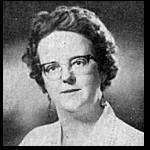
 |
||
| Auld | ||
| Baghy | ||
| Boulton | ||
|
*
biography
|
||
| Kalocsay | ||
| Mikhalsky | ||
| Szathmari | ||
| Home | ||
| Esperanta versio | ||
| DHTML version for version 4 browsers | ||
|
Marjorie Boulton was born in 1924, and was educated i.a at Oxford where she received a doctorate in literary studies. She was for many years the director of a teacher' college, but is now a professional writer, whose series of introductory texts in English on literaray studies has been widely used. In 1949 she learned Esperanto and made her debut in the Esperanto literary domain through the Belartaj Konkursoj (Fine Arts Competitions). Marjorie Boulton is currently a member of the Esperanto Academy, an advisory body on language questions. Her first collection of poems Kontralte (In Contralto), was published by Stafeto in 1955. Further poetry collections followed: Kvarpieda kamarado (Four-footed friend), Cent ghojkantoj (One hundred songs of joy), and Eroj (Bits and pieces), in 1956, 1957, and 1959 respectively. Virino che la landlimo (Woman at the frontier) - a collection of short plays and stories, also appeared in 1959. In 1960 (and again in 1980), Keegan Paul published Boulton's English language biography Zamenhof, Creator of Esperanto, the Esperanto editon of which appeared in 1962. Two short story collections have apeared in book form: Dek du piedetoj (Twelve little feet) and Okuloj (Eyes), in 1964 and 1967 respectively. In collaboration with William Auld, she produced Rimleteroj (Rhyming letters), which was published in 1964. In 1983 her study of the work of Gyulya Baghy - Poeto Fajrakora, was published, and in the following year Faktoj kaj Fantazioj (Facts and Fantasies) - an intermediate reader drawing on folktales from around the globe. The writing of Marjorie Boulton is mature, socially engaged and infused with warmth, sincerity and a profound humanism. A knack for finding the appropriate word or form of expression is evident throughout. Her work is multi-faceted. She displays a keen sense of humour and at the same time is not afraid to reveal her own private passions and torments. |
|||
| TOP | |||